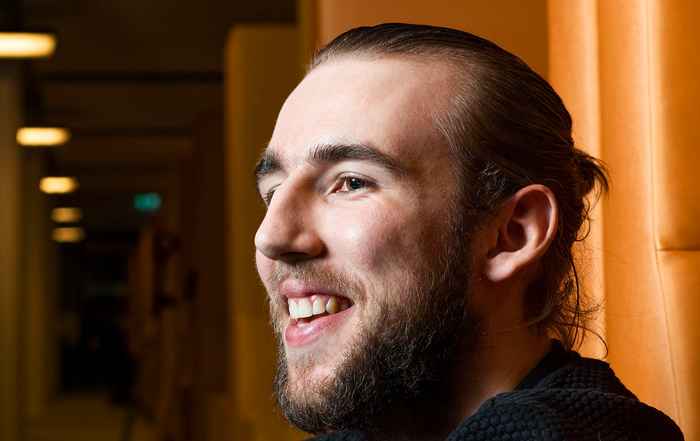Olmo van der Mast

Who? Olmo van der Mast (1995)
Studied: Academic PABO Amsterdam (UPvA) and Research Master's in Child Development and Education
First job: Paper round
Favourite spot at the UvA: The building of the Academic PABO Amserdam on the Roeterseiland Campus
Essential: Good lecturers
Olmo van der Mast (1995) is working toward a Bachelor's in Academic PABO Amsterdam and a Research Master's in Child Development and Education. Teaching runs in his family. After researching the options online and attending a variety of open days, he whole-heartedly chose the Academic PABO Amsterdam (UPvA). The deciding factor was the possibility of combining his teacher training with an academic degree programme at the UvA. Olmo began the programme with the idea of one day teaching at a primary school. His plan, however, took an unexpected turn when he became a student assistant in the UPvA programme. Just like that, a future university lecturer was born.
You originally wanted to be a primary school teacher. What made you change your mind?
‘Pupils between the ages of 4 and 12 tend to be much more eager to learn than teens in secondary school. Consequently, I wanted to specifically focus on this young target group and not on secondary school students. However, I also knew that more options were available to me thanks to the combination with the research university. Because you are studying Pedagogical Sciences, you acquire a tremendous amount of knowledge about the general and atypical development of pupils. To me, that is a major added value of the UPvA. As a result, graduates often become in-house supervisors at schools, to help children with special needs. Another added value is the inquisitive attitude we are taught; we always look at why something works or does not work and how we can do things differently.'
In reality, teaching is a ridiculously difficult job.
Teaching or research?
'Around half of UPvA students immediately go into education after graduating from the programme. The other half pursues a Master's degree. Personally, I realised during my fourth year that I really love doing research. Whereas I had difficulty completing my work placement that year, I received a high mark for my thesis. 'Every class has pupils that make you question how you should handle them. I had one Year 2 class, where there was a boy who was very aggressive and never listened. He did whatever he pleased and his parents never disciplined him. In such cases, your role as the teacher is not substantial enough to truly change such behaviour. In reality, it is a ridiculously difficult job. You have to teach many different subjects while simultaneously managing the class and monitoring the pupils' behaviour. On top of all that, you also have to communicate with the parents. That prompted me to enrol in the Research Master's in Child Development and Education after the UPvA. The programme trains you to conduct research in the field of education. For example, we examine the effectiveness of teaching methods, the potential influence of diversity on learning outcomes and on teacher-student relationships, and the extent to which it makes a difference if you speak a different language at home than at school. Although I have taken a step back from teaching, I am still involved in education and how it can be improved. We gain more statistics and research methods, which are exactly the things that I like.’
Hopefully, our research will contribute to improving educational practice.
Can't you come up with a way to make it easier for everyone?
‘Yes – and that's precisely what I'm doing at the moment, by participating in research projects in which theory and practice are closely linked. I do not want to produce studies that are only read by other academics; I want to improve educational practice through my research. You actually have to write two theses in the Research Master's programme. Last year, I conducted a study in which I did not collect the data myself, but I will have to do it this year. I am currently working on a wide-ranging project involving both the UvA and the AUAS. Basically, the question is how to tackle controversial social topics in class. Examples include racism, sexism and homosexuality. This is an extremely interesting theme to me. Teachers find it difficult to discuss these topics and sometimes even avoid them altogether. This research project trains them to discuss these topics. I subsequently talk to them about whether and how the training helped them. Hopefully, our research will contribute to improving educational practice.'
I can see myself becoming a university professor.
You are currently teaching university students. How are you enjoying it?
‘It's fantastic. Last year, I became a student assistant at the UPvA. I teach research courses to first- and second-year Bachelor's students. These are courses I personally enjoyed, so I get a lot of satisfaction from teaching students how to design a scientific study, formulate a research question or conduct a literature survey. I also teach them how to do empirical studies in which they develop their own observation tools and questionnaires and apply them in practice. Teaching university students is very different from teaching primary school pupils, of course. I actually really like it. To me, the advantage of this target group is that you are always focused on the content. You truly help the students advance and can engage them in discussions about the topics you cover. I can see myself as a university professor teaching research skills or statistics. Because there is a huge shortage of teachers right now, every effort is being made to attract and train more teachers. This is great for us, of course; you can start working immediately wherever you want.’